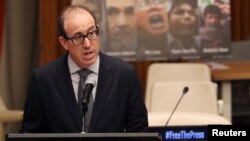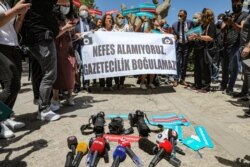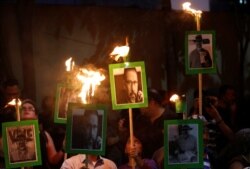The work of journalists is becoming more dangerous, with record numbers detained for their coverage, and dozens killed each year.
As of December, more than 290 journalists were in prison for their work and at least 24 had been killed, according to the U.S.-based Committee to Protect Journalists. The group's data reflect an increasingly dangerous environment for the media.
As executive director of CPJ, Joel Simon has seen how journalists have changed the world while becoming a target for repressive forces.
In an interview with VOA last month, Simon talked about the increased risks to global media.
"The mere act of doing journalism — especially accountability journalism, journalism that threatens people in power — is inherently dangerous," he said.
After nearly 25 years at CPJ — 15 as executive director — Simon will leave his position on December 31, but says he remains committed to defending press freedom.
This interview has been edited for clarity and length.
Question: How has press freedom around the world changed during your tenure as CPJ's executive director?
Joel Simon: When I started at CPJ in 1997, it was a period of profound optimism, about democracy, about human rights, about press freedom. After all, journalists played a critical role in the collapse of the Soviet Union. Reporting in Latin America helped lead to the collapse of military governments in that region.
There was a sense that independent journalism could really change the world, and I think that maybe it did. But then there's been this terrific backlash.
Repressive governments, autocratic governments all over the world understand that, particularly because of technology. And in the information age, those who control the narrative control power.
Journalists help shape public perception. They help shape narratives. So, they're in conflict with governments around the world — both repressive governments that use violence and legal action, but also in democracies.
More and more, people are living under governments that are partly free and are living in an environment in which press freedom has deteriorated, in which their ability to access information and independent media and hold governments accountable is more limited.
That's the moment we find ourselves in now. And I do think that the pendulum will swing someday. It always does. But we have to recognize this moment in history.
The environment for independent journalism has changed everywhere, including in the United States. The challenges are greater. That period of profound optimism that existed when I started this job 25 years ago … unfortunately, that's no longer the case.
Q: What remedies should exist to protect and support journalists?
Simon: There needs to be a recognition that these are long-term trends and that the reasons that they're occurring are complex. There simply are no short-term solutions.
The one thing we can certainly do that's really critical is the United States has to be in a position to assert global leadership. And it isn't currently.
I think that U.S. leadership really matters on these issues.
When (former) President (Donald) Trump started using the term "fake news" and calling journalists "enemies of the people," we saw autocratic governments around the world adopt that same rhetoric and use it to suppress independent journalism.
When we saw the (George W.) Bush administration adopt the rhetoric of the war on terror, we saw governments crack down on the media under the guise of suppressing terrorism.
In the Biden administration, what happened in Afghanistan really undermined U.S. credibility. Journalists who built a vibrant media community in that country came under tremendous threat with the collapse of the regime, and the U.S. government did not step up to protect them.
Those journalists were disappointed. Journalists around the world saw what happened, and I think that has further damaged U.S. credibility.
Q: Are there any particular cases that really resonate with you?
Simon: This job as executive director of CPJ, it's a job where you get to know heartbreak and loss.
I have lost so many friends. I've lost journalists who come into my office, some of them have won (CPJ's) International Press Freedom Award. And they won it because they're so courageous, they're fearless. But that fearlessness means sometimes that they don't understand and identify and respond to the threats against them.
I'm going to talk about one friend of mine — Javier Valdez Cardenas, in Mexico. He was honored with an International Press Freedom Award for his courageous coverage.
Several years after he received the award, he was receiving threats. We had conversations with him. We wanted to evacuate him. He said he couldn't leave. He said he had to stay and continue to cover the story.
He was killed (in May 2017). And that was so tragic, because it was really ultimately avoidable.
We understood why he wouldn't leave, but we were heartbroken. All we can do is fight for justice.
That's always a difficult fight. But some of the people who carried out that crime are in prison today, and we'll continue to fight for justice in his case and so many others around the world.
Q: What kinds of coverage can lead to attacks on the media?
Simon: When you see journalists killed, they tend to report on organized crime. Daphne Caruana Galizia, the blogger who was murdered in Malta (in 2017), had exposed the web of official protection in Malta.
Or if you look at some of the journalists who've been murdered in Russia, or in Mexico, or Jan Kuciak (in Slovakia in 2018). They were all reporting on the intersection of organized crime and government protection that facilitates and allows those criminal networks to operate.
When journalists expose that network, they threaten the bottom line. Unfortunately, in many parts of the world, that can get you killed.
Q: What inspires you to continue?
Simon: What inspires me is I really think there is nothing more essential in the way that humans connect with one another … (than) sharing information. And journalism is absolutely essential to that.
So, I am profoundly optimistic that that need will remain, and that people will continue to fight to get access to the information that they need to make sense of their lives. And support the journalists who do that work.
Where I'm less optimistic is that those kinds of efforts threaten entrenched power structures, including authoritarian states. And they're becoming more and more adept at managing and controlling and retaining their ability to set the narrative.
We must keep fighting, because press freedom is the battle of the information age, and we must prevail.
My optimism stems not from examining the current reality, but from a recognition of what's at stake. I believe that many people around the world recognize that they ultimately support independent journalism. They ultimately recognize the value of what journalists do. And they're ultimately willing to fight for it.







